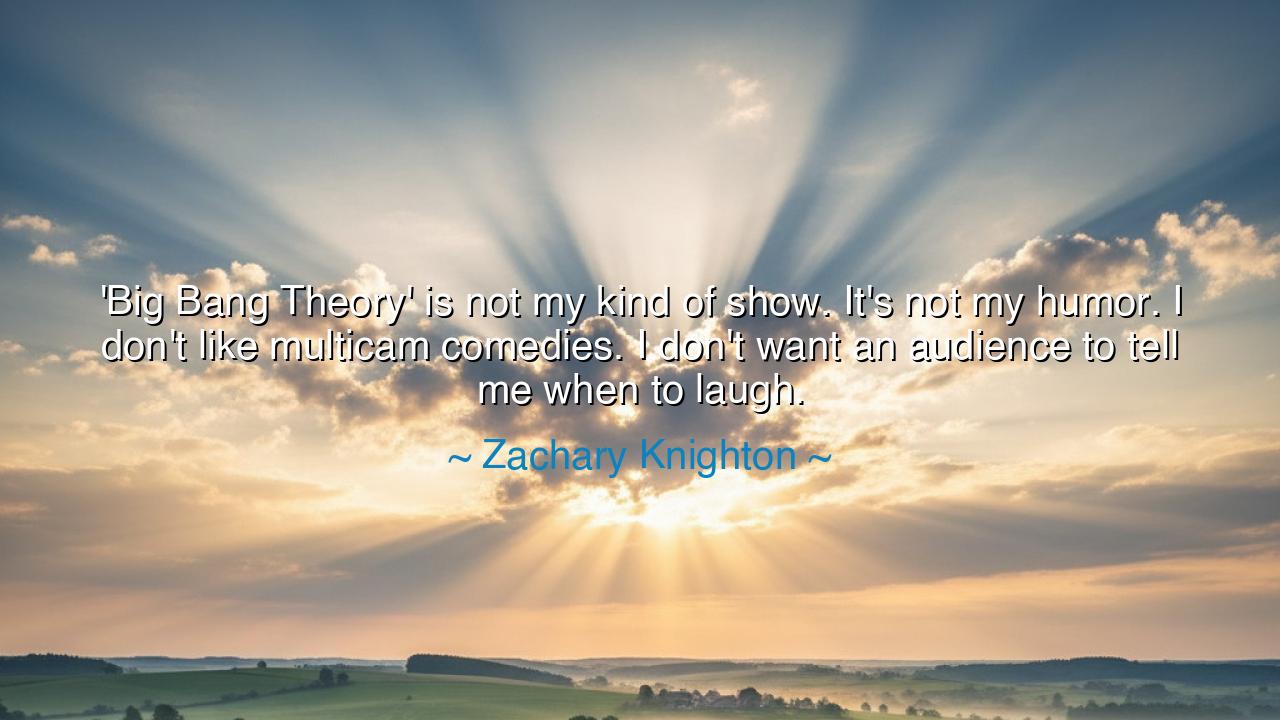
'Big Bang Theory' is not my kind of show. It's not my humor. I
'Big Bang Theory' is not my kind of show. It's not my humor. I don't like multicam comedies. I don't want an audience to tell me when to laugh.






Hear now, O Children of the Earth, the words of Zachary Knighton, who, in his reflection on the nature of comedy, spoke thus: “‘Big Bang Theory’ is not my kind of show. It’s not my humor. I don’t like multicam comedies. I don’t want an audience to tell me when to laugh.” In these words, we find not just a personal preference, but a profound statement on the nature of authenticity in art, and the struggle of the individual to remain true to their own voice amidst the forces of convention. Knighton’s rejection of what he perceives as the manipulation of laughter—a laughter directed by the cues of a live audience—calls us to question the very nature of the entertainment we consume and the power of laughter as a pure, undirected force.
What, then, is the meaning behind his rejection of this form of comedy? The show that Knighton refers to, "Big Bang Theory," and others like it, present humor in a very controlled manner. The jokes are crafted with the expectation that the audience will laugh at the right moments, guided by the sounds of canned laughter or the presence of a live crowd. To Knighton, this creates a false experience—a forced connection between the audience and the material, where genuine reaction is replaced by the expectation of response. In his eyes, this diminishes the true power of comedy, which should arise naturally from the hearts of those who create it and those who receive it.
Let us take heed of this, O Children of the Earth. The authenticity of art, whether in comedy or any other form, is sacred. It must not be dictated by external forces but must flow from the wellspring of the creator’s heart. We can see echoes of this truth in the life of the great philosopher Socrates, who rejected the traditional modes of teaching and sought to engage directly with his students. Rather than teaching through rigid structures or prescribed answers, Socrates invited his disciples to think for themselves, to engage in dialogue, and to seek truth through unforced exploration. Just as Socrates rejected the preordained wisdom of his time, so too does Knighton reject the preordained laughter of the stage-managed comedy show.
In the ancient theater, the performance was not confined to the boundaries of a single room or a predictable script. Great playwrights such as Sophocles and Aeschylus wove tragedies and comedies that resonated with deep, universal themes. The laughter of the audience, when it came, was not orchestrated—it arose naturally from the exploration of the human condition. It was raw and real, a reflection of the audience’s engagement with the performance. To manipulate this process, to create laughter through external cues, is to undermine the deep connection between the audience and the work. Thus, Knighton’s sentiment echoes the wisdom of the ancients, who believed that true art must be free, not confined by artificial structures that diminish its impact.
Knighton’s words also bring to light the battle between individualism and mass production, between the true expression of self and the commodification of entertainment. In modern times, multicam comedies with their pre-determined laughs are often seen as a product of the commercial entertainment industry, designed to appeal to the widest audience possible, often at the expense of depth and originality. This drive for popularity, for mass appeal, can create a world where true creativity is sacrificed for comfort and predictability. Knighton’s rejection of this type of humor is, therefore, a call for freedom—a call to create art that speaks from the heart, without the chains of external expectation.
Let us take this lesson into our own lives. When we engage with art—whether it be comedy, literature, or any form of creative expression—we must not allow ourselves to be swayed by external forces that seek to dictate our reactions. Instead, we must seek that which resonates with the truth of our own experiences. Just as Knighton rejects the forced laughter of the multicam setup, so too should we reject anything that attempts to manufacture our emotions. Art should be a conversation between the creator and the audience, not a manipulation of their responses. Let us embrace what is real, what is raw, what is deeply felt.
Thus, O Children of the Earth, the lesson here is clear: true authenticity in art comes when we embrace the freedom to create and to experience without the constraints of outside expectation. Let us remember that humor, like all art, must not be controlled by others, but must arise naturally from the hearts of those who experience it. In seeking that which is genuine, we enrich our own lives and the world around us, creating space for laughter that is not dictated by the stage, but by the soul.






AAdministratorAdministrator
Welcome, honored guests. Please leave a comment, we will respond soon